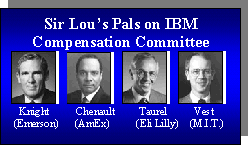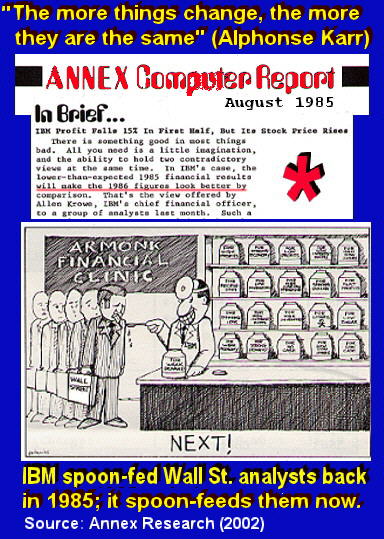
Annex Research| Annex Bulletins| Quotes| Workshop| Search| Clips|
Activism|
Columns|
![]()
The copyright-protected information contained in the ANNEX BULLETINS is a
component of the Comprehensive Market Service (CMS). It is intended for the exclusive use
by those who have contracted for the entire CMS service.
A SPECIAL ANNEX NEWSFLASH
SEC Chairman Harvey Pitt Calls for Stricter Controls of Stock Option Exercises
SEC to Tighten Stock Option Rules
Pitt Speaks Out at Northwestern University
EVANSTON, IL, Apr. 5 - Further to our own analysis of IBM insider trading and self-enrichment through stock options (see below), the SEC chairman Harvey Pitt has now also voiced his concerns publicly. Enclosed is an excerpt from today's Wall Street Journal article about a speech he gave last night at Northwestern U. We've taken the liberty of highlighting some salient passages in red.
THE WALL STREET JOURNAL - FOR FAIR USE ONLY
April 5, 2002
SEC Chairman Harvey Pitt Calls
For Stricter Controls Over OptionsBy GREG IP, KATE KELLY and JOANN S. LUBLIN
Staff Reporters of THE WALL STREET JOURNAL
Amid mounting scrutiny of the role stock options have played in recent corporate controversies, Securities and Exchange Commission Chairman Harvey Pitt called for stricter controls over how such options are doled out to senior management.
The move by Mr. Pitt comes even as the New York Stock Exchange and the Nasdaq Stock Market move closer to strengthening their oversight of the companies listed on the country's two biggest stock markets.
In a speech Thursday night, Mr. Pitt said a special compensation committee of a given company's board, made up of independent directors, should decide whether to grant stock-option plans for top company executives and directors and the terms of those plans. Then those plans should be submitted for shareholder approval. At present, the NYSE and Nasdaq require some but not all option plans to be submitted for such approval.
Options are meant to align managers' interests with that of
shareholders, but "if managers can reap profits from their options while shareholders are losing some or all of their equity stake, the options create conflicting, not aligned, interests," Mr. Pitt said in a speech at Northwestern University in Evanston, Ill. "If a company chooses to grant options to corporate managers to create incentives to build value in the company, the options actually work as intended, rather than create an unearned windfall for those managers."
Boards should consider requiring executives to show long-term growth before they can exercise their options, to "help abolish the perverse incentive to manage earnings, distort accounting or emphasize short-term stock performance," he said.
Mr. Pitt didn't say how these controls should be implemented, but in his speech he indicated he preferred private-sector bodies, such as the NYSE and Nasdaq, to establish the duties of corporate officers rather than federal regulators. He said that government can outlaw fraudulent practices but it can't easily "legislate integrity or ethics."
In closed-door meetings Thursday and Friday, the NYSE and Nasdaq have been hammering out a range of proposals for tightening the governance of publicly traded companies. The brainstorming sessions are taking place, at least in part, at the behest of Mr. Pitt, who in mid-February asked both markets to look closely at their requirements regarding companies' disclosure of potentially material information and the structure of their boards of directors, among other issues.
Following a string of corporate scandals, the big markets have caught some criticism for not responding more quickly to tighten the governance rules on big companies. Mr. Pitt asked both markets to share their findings with him as early as April 13.
Leon Panetta, the former chief of staff for the Clinton administration and one of the NYSE board members leading the review committee, said in an earlier interview that the panel's job is to "try to look at the obvious issues that have been raised by the whole Enron debacle, and try to get ahead of the curve in [seeing] what needs to be done in terms of corporate governance."
Generous grants of options have become increasingly controversial as disclosures emerge that senior executives of companies such as Enron Corp.
reaped millions of dollars in profit by exercising stock options, even as public investors and employees held on to stock that eventually became worthless. Some lawmakers in Congress and Federal Reserve Chairman Alan Greenspan have argued that companies should be required to treat option grants to employees and executives as an expense, which would depress reported profits. Mr. Pitt has been cool to that idea. [...]
For a direct URL to this article, click here.
---
Annex Ed. "Reaped millions of dollars in profit by exercising stock options?" How about nearly half a billion dollars by a single individual? Or by more than a dozen of top officers who all decided to scratch the same itch at the same time, and bail out by exercising their stock options in 2001? (just before IBM reported its worst growth quarter in Gerstner's nine-year tenure).
And by the way, the "independent
directors" that
Pitt was talking about are practically never really independent. They may not be
drawing an employment salary, but they are appointed to the Board by the
chairman, and are indebted to him, as the members of the IBM Executive
Compensation Committee have proven (just click on the above image to read
their pitiful "justification" for huge stock awards).
about are practically never really independent. They may not be
drawing an employment salary, but they are appointed to the Board by the
chairman, and are indebted to him, as the members of the IBM Executive
Compensation Committee have proven (just click on the above image to read
their pitiful "justification" for huge stock awards).
Now extrapolate such travesties that across the entire landscape of corporate America, and you will understand why the SEC chairman is feeling a little heat under his feet, and is passing it on to the NYSE and Nasdaq boards. Who, in turn, are likely to pass it on to the corporate boards.
For our own report on IBM insider stock option trades, check out:
An Analysis of IBM Insider Stock Trading in 2000-2001
Outgoing Chairman of "IBM Greed, Inc." Dumped About $238M of Big Blue’s Stock in Last Two Years While Hyping Up Big Blue’s Bright Future; Other Top Insiders Followed Suit in 2001 and Cashed In
Happy bargain hunting!
Bob Djurdjevic

[For more details on "financial engineering" -- a new IBM line of business, as we put it back in 1997 -- see "Big Blue Starting to Unravel," (Apr. 8, 2002), “SEC to Tighten Stock Option Rules” (Apr. 5, 2002), "Sir Lou OutLayed Lay!" (Apr. 1, 2002), "IBM Pension Fund Vapors," (Mar. 23, 2002), Is IBM Cheating on Taxes, Annex Bulletin 99-17 (May 1999), Fortune on IBM (June 15, 2000), Annex Bulletin 98-14 ("Wag the Big Blue Dog"), Armonk's Fudge Factory (Apr. 9, 1999), Where Armonk Meets Wall Street, Greed Breeds Incest (November 1998), Stock Buybacks Questioned: Is IBM Mortgaging Its Future Again?, 97-18 (4/29/97), "Some Insiders Cashed In On IBM Stock's Rise, Buybacks" 97-22, 7/27/97, Djurdjevic’s Forbes column, "Is Big Blue Back?," 6/10/97; “Executive Suite: How Sweet!,” (July 1997), "Gerstner: Best Years Are Behind", Aug. 10, 1999), "IBM's Best Years Are 3-4 Decades Behind Us" (July 1999), "Lou's Lair vs. Bill's Loft" (June 1999), "Corporate Cabbage Patch Dolls," 98-39, 10/31/98; Djurdjevic’s Chronicles magazine October 1998 column, "Wall Street Boom; Main Street Doom" etc.].
Or just click on  and use "financial engineering" as keywords.
and use "financial engineering" as keywords.
